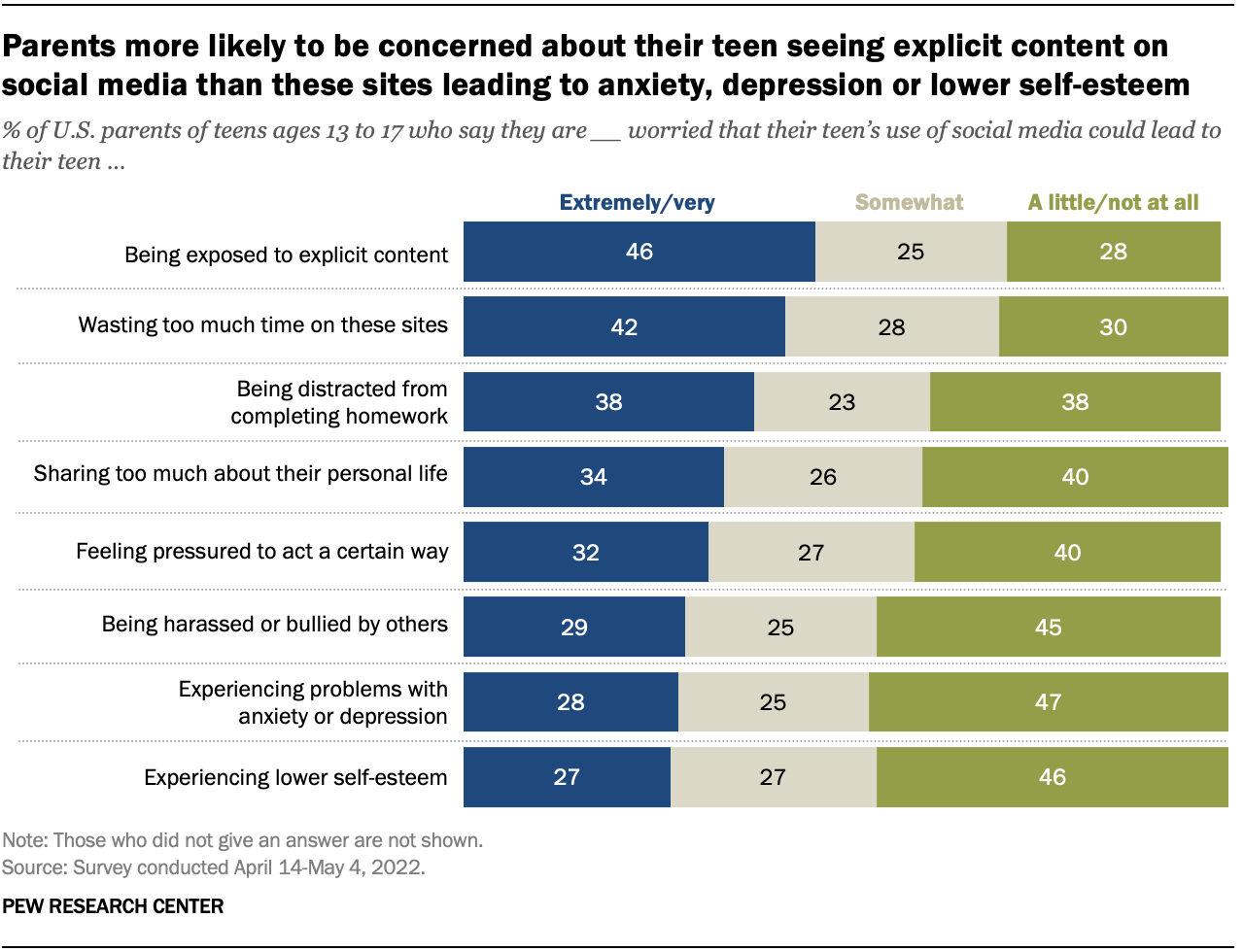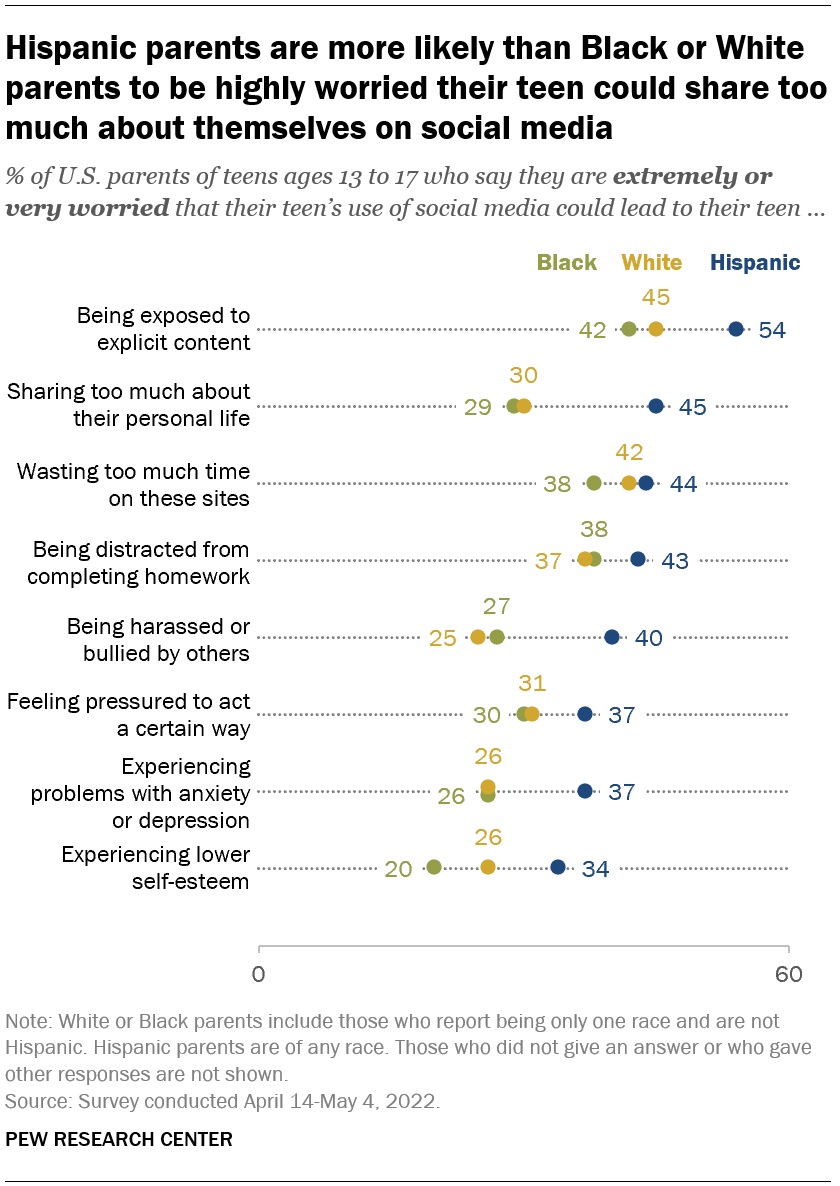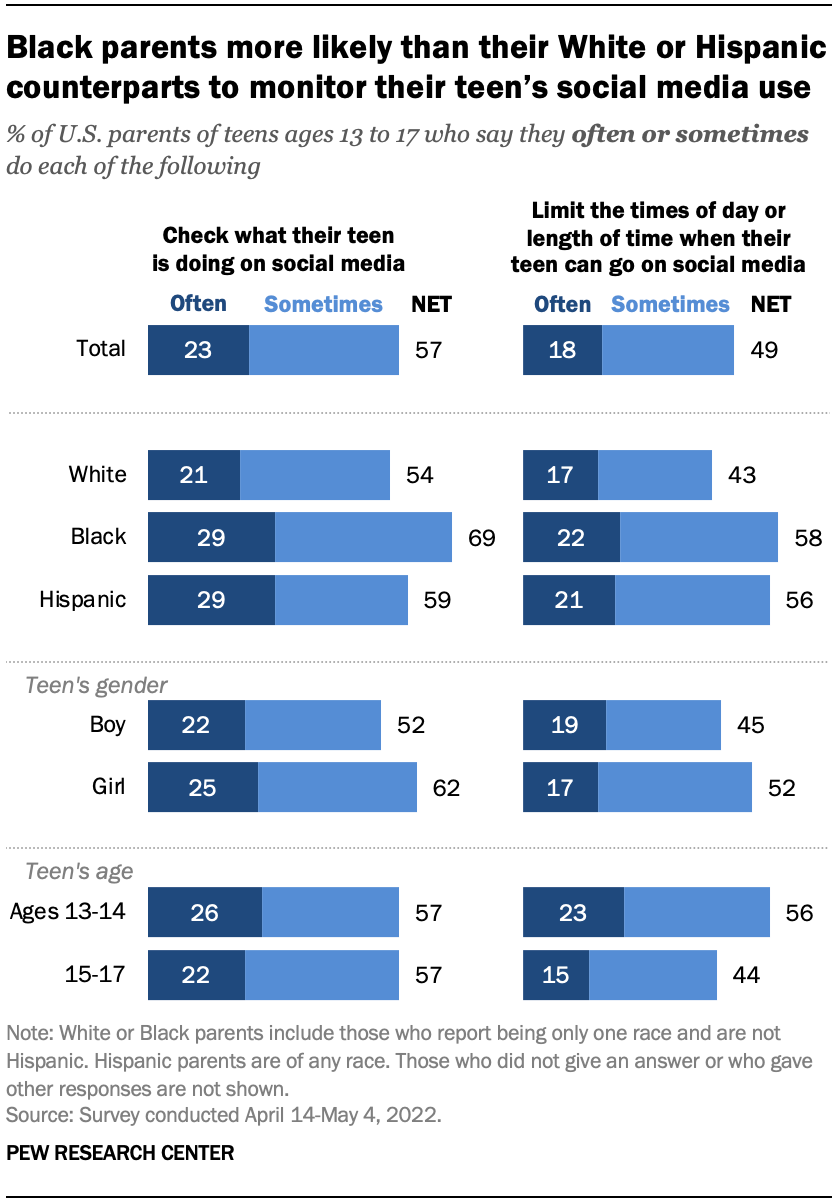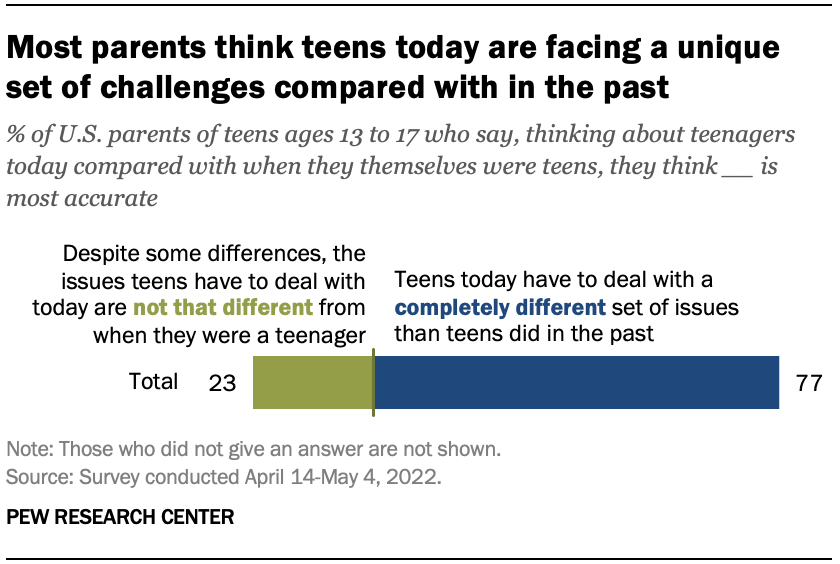
Parents have a range of concerns when it comes to their teenagers using social media, with access to explicit content and time-wasting ranking among those at the top of the list, according to a Pew Research Center survey of parents of teens ages 13 to 17 conducted this spring. The survey also shows that a majority of parents are keeping a watchful eye on what their teens do on social media. Some are also imposing screen time restrictions on these sites.
Pew Research Center conducted this study to better understand parents’ worries and practices around their teens’ social media use. For this analysis, we surveyed 1,316 U.S. parents of teens ages 13 to 17. The survey was conducted online by Ipsos from April 14 to May 4, 2022.
This research was reviewed and approved by an external institutional review board (IRB), Advarra, which is an independent committee of experts that specializes in helping to protect the rights of research participants.
Ipsos invited panelists who were a parent of at least one teen ages 13 to 17 from its KnowledgePanel, a probability-based web panel recruited primarily through national, random sampling of residential addresses, to take this survey. For some of these questions, parents were asked to think about one teen in their household (if they had multiple teen children ages 13 to 17 in the household, one was randomly chosen). The survey is weighted to be representative of U.S. parents of teens ages 13 to 17 by age, gender, race, ethnicity, household income and other categories.
Here are the questions used for this report, along with responses, and its methodology.
Terminology
Parents of a teen or parents of teens is used in this analysis to refer to adults who report being a parent of at least one child between the ages of 13 and 17 but who may also have other children. In cases where respondents have more than one child in this age range, the survey asked parents to focus on one specific teen as they answered questions, prompting them with the age and gender of this randomly selected teen from a list of their children that they provided.

While social media has allowed people to easily seek out information, some say it has also made inappropriate and explicit content more accessible. Nearly half of parents of teens (46%) say they are extremely or very worried that their teen’s use of social media could lead to them being exposed to explicit content, according to the April 14-May 4, 2022, poll.
The impact of social media on productivity is also a key concern for parents. Some 42% say they are extremely or very worried about their teen wasting too much time on social media, while 38% express the same level of concern about their child being distracted from completing their homework because they are using social media.
About a third of parents (34%) are extremely or very worried about their teen sharing too much about their personal life. Roughly three-in-ten say the same about social media leading their teen to feel pressure to act a certain way (32%), be harassed or bullied (29%), experience problems with anxiety or depression (28%) or experience lower self-esteem (27%). Still, about half of parents (47%) say they are only a little or not at all worried about social media causing anxiety or depression in their teen.

Parental concerns about social media vary by race and ethnicity. Hispanic parents are more likely to express a high level of concern about many of these issues compared with Black and White parents. For example, 45% of Hispanic parents say they are extremely or very worried that their teen’s social media use could lead to them oversharing online, compared with 30% of White parents and 29% of Black parents. Hispanic parents are also more likely than White and Black parents to be extremely or very concerned about social media leading to cyberbullying, anxiety or depression, exposure to explicit content, or lower self-esteem. (There were not enough Asian American parents in the sample to analyze separately.) However, similar shares of parents across racial and ethnic lines say they are extremely or very worried about social media causing distractions from homework, time-wasting and social pressure for their teen children.
Parental concerns about the impact of social media on their teens’ mental health differ by the child’s gender as well. Parents of teen girls are more likely than parents of teen boys to say they are extremely or very concerned that social media use might lead their teen to experience problems with anxiety and depression (32% vs. 24%) and lower self-esteem (30% vs. 23%).

The survey also shows that some parents intervene in their teens’ social media use in certain ways. One approach is to keep an eye on what teens are doing on social media, either manually or through the variety of apps that exist for this purpose. Another is to institute screen time limits, a method health and parenting websites also advocate.
A majority of parents (57%) say they at least sometimes check what their teen is doing on social media, while 49% say they often or sometimes limit the times of day or length of time when their teen can go on social media.
Black parents of teens are more likely than Hispanic or White parents to check their teens’ social media activity. About seven-in-ten Black parents (69%) say they do this at least sometimes, compared with 59% of Hispanic parents and 54% of White parents. Black and Hispanic parents are also more likely than White parents to say they at least sometimes set social media time limits.
There are also differences in parents’ social media monitoring based on the gender or age of their teen. Parents of teen girls are more likely than those of teen boys to say they often or sometimes monitor their child’s social media and limit their teen’s social media time. And parents of 13- to 14-year-olds are more likely than those with 15- to 17-year-olds to report limiting when and how long their child can be on social media sites.
More broadly, parents of teens generally agree that the world is very different from the one they themselves grew up in, according to the recent survey.

When thinking about teenagers today compared with when they themselves were teens, 77% of parents say teens today have to deal with a completely different set of issues than they did in the past. Far fewer (23%) say that despite some differences, the issues that teens have to deal with today are not that different from when they themselves were teenagers.
There are no differences in opinion on this question across most demographic groups. But it is important to note that the survey was fielded in the spring of 2022, when many families had or were recently dealing with disruptions caused by the coronavirus pandemic.
Note: Here are the questions used for this report, along with responses, and its methodology.
